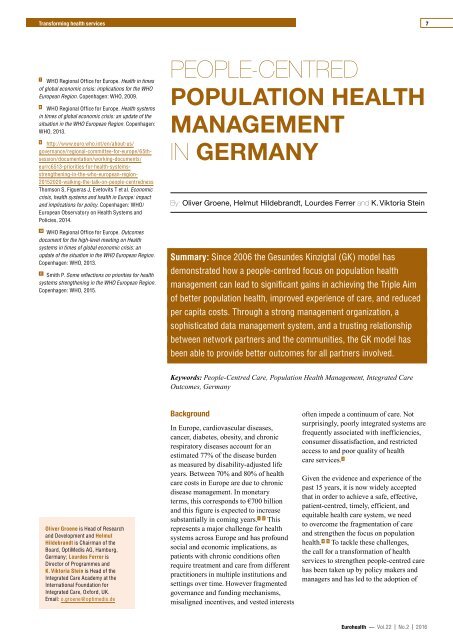EUROHEALTH
Eurohealth-volume22-number2-2016
Eurohealth-volume22-number2-2016
Create successful ePaper yourself
Turn your PDF publications into a flip-book with our unique Google optimized e-Paper software.
Transforming health services<br />
7<br />
7<br />
WHO Regional Office for Europe. Health in times<br />
of global economic crisis: implications for the WHO<br />
European Region. Copenhagen: WHO, 2009.<br />
8<br />
WHO Regional Office for Europe. Health systems<br />
in times of global economic crisis: an update of the<br />
situation in the WHO European Region. Copenhagen:<br />
WHO, 2013.<br />
9<br />
http://www.euro.who.int/en/about-us/<br />
governance/regional-committee-for-europe/65thsession/documentation/working-documents/<br />
eurrc6513-priorities-for-health-systems-<br />
strengthening-in-the-who-european-region-<br />
20152020-walking-the-talk-on-people-centredness<br />
Thomson S, Figueras J, Evetovits T et al. Economic<br />
crisis, health systems and health in Europe: impact<br />
and implications for policy. Copenhagen: WHO/<br />
European Observatory on Health Systems and<br />
Policies, 2014.<br />
10<br />
WHO Regional Office for Europe. Outcomes<br />
document for the high-level meeting on Health<br />
systems in times of global economic crisis: an<br />
update of the situation in the WHO European Region.<br />
Copenhagen: WHO, 2013.<br />
11<br />
Smith P. Some reflections on priorities for health<br />
systems strengthening in the WHO European Region.<br />
Copenhagen: WHO, 2015.<br />
PEOPLE-CENTRED<br />
POPULATION HEALTH<br />
MANAGEMENT<br />
IN GERMANY<br />
By: Oliver Groene, Helmut Hildebrandt, Lourdes Ferrer and K. Viktoria Stein<br />
Summary: Since 2006 the Gesundes Kinzigtal (GK) model has<br />
demonstrated how a people-centred focus on population health<br />
management can lead to significant gains in achieving the Triple Aim<br />
of better population health, improved experience of care, and reduced<br />
per capita costs. Through a strong management organization, a<br />
sophisticated data management system, and a trusting relationship<br />
between network partners and the communities, the GK model has<br />
been able to provide better outcomes for all partners involved.<br />
Keywords: People-Centred Care, Population Health Management, Integrated Care<br />
Outcomes, Germany<br />
Oliver Groene is Head of Research<br />
and Development and Helmut<br />
Hildebrandt is Chairman of the<br />
Board, OptiMedis AG, Hamburg,<br />
Germany; Lourdes Ferrer is<br />
Director of Programmes and<br />
K. Viktoria Stein is Head of the<br />
Integrated Care Academy at the<br />
International Foundation for<br />
Integrated Care, Oxford, UK.<br />
Email: o.groene@optimedis.de<br />
Background<br />
In Europe, cardiovascular diseases,<br />
cancer, diabetes, obesity, and chronic<br />
respiratory diseases account for an<br />
estimated 77% of the disease burden<br />
as measured by disability-adjusted life<br />
years. Between 70% and 80% of health<br />
care costs in Europe are due to chronic<br />
disease management. In monetary<br />
terms, this corresponds to €700 billion<br />
and this figure is expected to increase<br />
substantially in coming years. 1 2 This<br />
represents a major challenge for health<br />
systems across Europe and has profound<br />
social and economic implications, as<br />
patients with chronic conditions often<br />
require treatment and care from different<br />
practitioners in multiple institutions and<br />
settings over time. However fragmented<br />
governance and funding mechanisms,<br />
misaligned incentives, and vested interests<br />
often impede a continuum of care. Not<br />
surprisingly, poorly integrated systems are<br />
frequently associated with inefficiencies,<br />
consumer dissatisfaction, and restricted<br />
access to and poor quality of health<br />
care services. 3<br />
Given the evidence and experience of the<br />
past 15 years, it is now widely accepted<br />
that in order to achieve a safe, effective,<br />
patient-centred, timely, efficient, and<br />
equitable health care system, we need<br />
to overcome the fragmentation of care<br />
and strengthen the focus on population<br />
health. 4 5 To tackle these challenges,<br />
the call for a transformation of health<br />
services to strengthen people-centred care<br />
has been taken up by policy makers and<br />
managers and has led to the adoption of<br />
Eurohealth — Vol.22 | No.2 | 2016
















